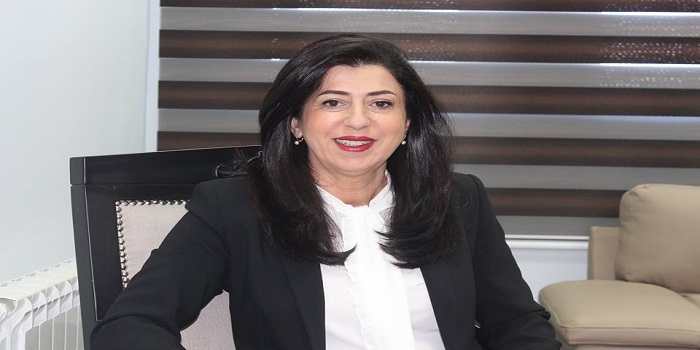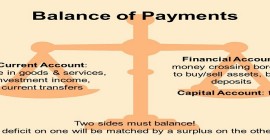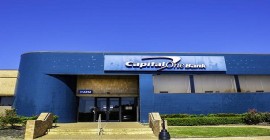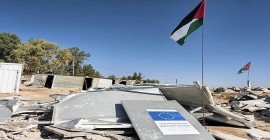Odeh: We are Focusing on Four Sectors and We Have a Comprehensive Economic Plan

Translated by Sabrin Qadah
Minister of National Economy Abeer odeh said: "The Palestinian economy is suffering a lot of obstacles, particularly the occupation, as the government always emphasizes that there cant be development under occupation.
One of the main obstacles facing the growth of the Palestinian economy is the inability to access and take advantage of the resources available in the so-called "C" areas, which constitute 61% of the West Bank within the "C" areas. This area considers the richest and agriculturally, which contains 90% of the capabilities of the Palestinian natural resources, which is a challenge for the Palestinian government in access to these areas.
Odeh pointed out that the World Bank estimated that Israeli restrictions on these so-called "C" areas cost the Palestinian economy about $ 3.4 billion annually, and that economic activities in that region capable of generating $ 800 million in tax revenues, and this is equivalent to half the Palestinian government debt, and that would be reflected positively on the performance of the Palestinian economy, and that obviates the funding and aid from donor countries. She added that the ministry's plan and the government aims to achieve economic growth according to available resources in cooperation with the Palestinian private sector. Odeh revealed on her efforts to revive the King Abdullah Bridge to facilitate and accelerate trade between Palestine and Jordan within the process of a deliberate plan that was frozen and conducted by the Jordanian Prime Minister.
She said that it is part of the ministry's priorities to provide attractive environment for investment through the legal infrastructure and legislative development as the Ministry of Economy is working to revise and update some laws, including the Companies Act as the law currently in force Jordanian Companies is the Law of 1964, which does not work in facing the challenges encountering companies in terms of their ratings or registration procedures, and does not also take into account the variables and recent developments.
Odeh noted that her ministry is in the final stage of the preparation of the law, while working on the development of other laws for the advancement of the Palestinian economic situation. One of these laws is Leasing, which will serve to stimulate economic activities and development, as this law is not limited to car rentals only, it includes the rental of equipment and devices that will help small and medium-sized enterprises in achieving their goals in production and thus in the growth and evolution, where the sector of small and medium enterprises in Palestine constitutes more than 90% of private sector’s enterprises.In addition to the adoption of secured transactions law, and movable and immovable properties in an attempt to overcome the major obstacles faced by SMEs in obtaining credit in Palestine.
Emancipation from the Israeli economy
In her answer to a question about the ministry's plans for the liberation of the Israeli economy, she said that the government and her Ministry have been able to make a breakthrough that its impact will appear in the future, where she has developed the national strategy for export in partnership with the private sector for the development and promotion of exports and has worked to ease the trade deficit. Odeh is currently working on an industrial strategy that focuses on import substitution and export development and work is underway to restructure economic sectors. By keeping track of Statistics of the reality of the Palestinian Israeli trade, the trade balance was heading to 80% in favor of the Israeli side, and dropped to 70 and to 60% in the past year.
She pointed to the existence of programs to improve the competitiveness of the Palestinian products, and that the national policy for quality has been developed in order to ensure increased capacity of the products to enter into regional and international markets and not rely on the Israeli market. With the realization that most of the exports from Israel are concentrated in the topic of electricity and oil, a project to generate electricity is being worked on.
The industries that have been concentrated on are stone and marble sector, the sector agri-food and food industries such as dates and olive oil and dairy products, processed meat products and others, furniture industry, shoes and leather, garment industry while working on pharmaceutical and Palestinian traditional products.
On the role of the ministry in the marginalized and vulnerable "c" areas, she said that the government has formed a national group to develop policies in order to identify priorities and interventions in the so-called "C" areas, where the ministry is a member, calling on the international community and donor countries to take the role and assume their responsibilities in order to provide support and fund projects to support these areas.
Asked about the plan that it is being worked on she said, "we finished preparing sectorial strategy for the Palestinian economy 2017- 2022, which has been fully prepared by relying on the agenda of national policies approved by the Palestinian Council of Ministers and the Palestinian government, which has been prepared by the national team and the Council of Ministers. The aim of the plan is essentially to achieve growth and create jobs, and also focus on creating an attractive environment for investment. "
She added: "The strategy will focus on highlighting the specificity of each of the provinces of the country, capacity, wealth, disciplines and industries in each of them. The plan is based on work on the guidance, distribution, sorting and management of resources, capacity and expertise in a proper, integrated and well-studied process to support the Palestinian economy, create jobs and drive economic growth."
Industrial zones
On the industrial zones in Palestine she said she has been supporting the development of an industrial zone in Bethlehem, an area of about 200 acres with French funding, currently operates six factories and there are 20 contracts signed for the establishment of factories in this region. The Commission provides them with technical and financial support through the stimulus package provided by Palestinian law for investment encouragement and some other projects, such as the French grant project.
The infrastructure of the industrial zone in Jericho has been supported with $90 million by the Japanese government, and the establishment of 13 factories in the region has also been supported by about $ 5 million. Financial support will be provided for 10 other factories during the next phase, with support up to nearly 50 % of the cost of the plant.
Currently, three factories operate in the Jericho area, and there are 40 contracts signed for the establishment of factories in the next phase in this region. The industrial zone in Jericho includes refrigerators and products packaging plants. Japan's experience has been benefiting from in these areas, with the possibility for all the factories to take advantage of this expertise, equipment, machines and refrigerators in agriculture and industry.
Work on the establishment of the industrial border Jenin region has been started with, which is considered one of the largest industrial areas, with an area of over 930 acres. It has been worked and thought about its establishment since 2000, but due to the sensitivity of its location on the Green Line, the Israeli authorities have hindered its launch on that date, as the government has refused to establish it in the so-called "c" zone. The matter has been discussed and with pressure from donor countries, it has been converted to B area.
The German side provides support in this region at a fraction valued $4.5 million. Turks has the responsibility of implementing the project, and will work to bring Turkish investments to this area, and provide equal incentives to any investor investing in the Turkish territory.
The area is a fertile agricultural region. It is an agricultural and industrial area with preferences and privileges of good facilities and, where in it production becomes feasible for export.
Israeli obstacles
The reasons for the delay in the opening of work in Jenin border industrial zone is the refusal of the Israeli side to convert this region from “c” to “b” area, which it took years. Only one year ago we started to build the walls of the region and equip it once we received Israeli approval. Preparation process takes two years and with the end of 2018, we will start the operation of factories and companies.
On the rest of the industrial areas in other governorates, she said that since a year and a half work on an industrial zone in Hebron has been going. However, the dilemma in the beginning was finding allocated lands to this area in one of the largest governorates of the West Bank, and after finding the space and appropriate site, it turned out that 1500 acres of the land are classified c areas, while the total area of the land is about 2,000 acres, and this is the dilemma.
"We continue to work with donor countries to put pressure on Israel in order to turn them into b areas so that we can start to work, but there is an outright Israeli rejection."
She added, "We have been informed by the Israeli side to start the building process for the permits to be given later, but from our side, we consider it risky and reject it in the light of our previous experience in the industrial area – Bethlehem. This happened where there was an area not exceeding 500 meters from a street in the so called “c” areas crossing the street leading to the industrial area. Israeli military shut down the street and imposed, more than once, arbitrary measures to obstruct the work for 40 days last summer in 2016 on the grounds that the area is under their powers. The street was not opened until after the French intervention and raising the issue with the French. "
In Gaza, there is an integrated industrial city since nineties- close to the Erez crossing, where from most of the factories emerged in the past years. In the Industrial Property Authority , we were able to re-plant it by operating about 70%. However, the basic problem was the problem of electricity. We were able to provide electricity 24 hours without a break and, and we try to work to export their products abroad.
The growth of national economy
Odeh said: 3.9% of growth has been achieved and this is considered a breakthrough. The average for the past three years was calculated. It was 3.3, which is a promising sign that there is growth and progress in the Palestinian economy, in spite of all Israeli obstacles.
About working on bringing investors to Palestine, she said that it is a hard work, and that the majority of investors assess risks that may face them and their projects if invested in the West Bank or the Gaza Strip as the political risks our high despite the very great returns.
If tracked the Palestinian financial market, 75% of listed companies achieve good profits and high, equal 30 to 40% of the capital and, which is not found in any country in the world.
She said, our problem is with the occupation. When planning for an investment conference, we ask for a 100-entry permit for investors and businessmen, where the military agrees on 5 to 10 investors out of the 100. Thus, if there had been an intention of investing in the Palestinian territories, the hardship of entering and obstructing the continuance and supervision on investments makes it difficult to persuade investors to come and investment.
No relations with Israelis
She said that there is no relationship with the Israeli side regarding the economic subject, as a Joint Committee meeting has not been held for the Paris protocol for years. There is no contact with the Israeli Ministry of Economy, and relationship with the Israeli side are concentrated within the technical topics that need a daily follow-up concerning people’s interests and their needs, especially the issue of import and export, obtaining the necessary licenses and certificates to do so in addition to specifications and technical instructions for the products.
On the economy of Jerusalem she said "it concerns us and we are focusing on it, and we have worked on the organization of the Chamber of Commerce's role in Jerusalem to do its best. The government has also made financial assistance of 3000 dollars per dealer, and we are currently working with all donors to support Jerusalem and coordinate this support to include all sectors and develop a plan for the development of Jerusalem and its advancement. "
In the context of talking about the global competitiveness indicators of our economy, Odeh said that the 3.9 economic growth shows the strength and vitality of the Palestinian economy compared with the surrounding region countries, which has less growth and weaker economy, knowing they are independent states and does not face occupation or its obstacles. Despite that, we are in a growing economic that develops and experiences advanced stages, that are involved in the global economy, even with a small fraction, as evidenced by global conventions and agreements signed with dozens of developed countries.
Vision for the next phase
The ministry's vision for the next phase in light of talking about the new American administration, a right-wing extremist government, complexities of Israeli measures to punish the PNA for gearing towards international institutions and the UN Security Council resolution 2334 against the settlement, Odeh said, "We are committed to the international legitimacy resolutions and expect from the new US administration that it will support the orientations of the international community, including resolution 2334, as settlements are an obstacle towards achieving the two-state solution and peace in the region. We look forward to all States to abide by this decision and apply the mechanisms for its implementation by divesting companies that invest in the settlements, boycotting settlements products and prohibiting their entry into international markets. "





